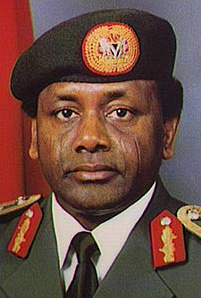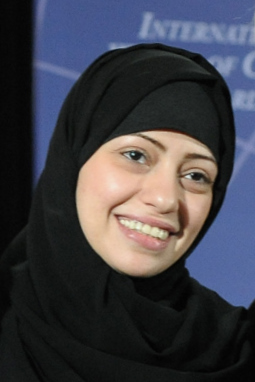
Kenule Beeson "Ken" Saro-Wiwa was a Nigerian writer, television producer, and environmental activist. Ken Saro-Wiwa was a member of the Ogoni people, an ethnic minority in Nigeria whose homeland, Ogoniland, in the Niger Delta, has been targeted for crude oil extraction since the 1950s and has suffered extreme environmental damage from decades of indiscriminate petroleum waste dumping.

Sani Abacha ; was a Nigerian Army General and politician who ruled as the military head of state after seizing power in 1993 until his death in 1998. Abacha's seizure of power was the last successful coup d'état in Nigerian military history.
The Ogoni Nine were a group of nine activists from the Ogoni region of Nigeria who opposed the operating practices of the Royal Dutch Shell oil corporation. Their members included outspoken author and playwright Ken Saro-Wiwa, Saturday Dobee, Nordu Eawo, Daniel Gbooko, Paul Levera, Felix Nuate, Baribor Bera, Barinem Kiobel, and John Kpuine.
The Movement for the Survival of the Ogoni People (MOSOP), is a social movement organization representing the indigenous Ogoni people of Rivers State, Nigeria. The Ogoni contend that Shell Petroleum Development Company (SPDC), along with other petroleum multinationals and the Nigerian government, have destroyed their environment, polluted their rivers, and provided no benefits in return for enormous oil revenues extracted from their lands.

The Ogonis are a people in the Rivers South East senatorial district of Rivers State, in the Niger Delta region of southern Nigeria. They number just over 2 million and live in a 1,050-square-kilometre (404-square-mile) homeland which they also refer to as Ogoniland. They share common oil-related environmental problems with the Ijaw people of the Niger Delta.
Sir Philip Beverley Watts is a former chairman of the multinational energy company Shell and a priest in the Church of England.

The Center for Constitutional Rights (CCR) is a progressive non-profit legal advocacy organization based in New York City, New York, in the United States. It was founded in 1966 by Arthur Kinoy, William Kunstler and others particularly to support activists in the implementation of civil rights legislation and to achieve social justice.

Shell Nigeria is the common name for Shell plc's Nigerian operations carried out through four subsidiaries—primarily Shell Petroleum Development Company of Nigeria Limited (SPDC). Royal Dutch Shell's joint ventures account for more than 21% of Nigeria's total petroleum production.

The current conflict in the Niger Delta first arose in the early 1990s over tensions between foreign oil corporations and a number of the Niger Delta's minority ethnic groups who feel they are being exploited, particularly the Ogoni and the Ijaw. Ethnic and political unrest continued throughout the 1990s despite the return to democracy and the election of the Obasanjo government in 1999. Struggle for oil wealth and environmental harm over its impacts has fueled violence between ethnic groups, causing the militarization of nearly the entire region by ethnic militia groups, Nigerian military and police forces, notably the Nigerian Mobile Police. The violence has contributed to Nigeria's ongoing energy supply crisis by discouraging foreign investment in new power generation plants in the region.

Monday Owens Wiwa is a medical doctor and human rights activist. He is the brother of executed Ogoni leader Ken Saro-Wiwa, and the son of Ogoni chief Jim Wiwa. Wiwa is an internationally renowned expert on the effects of globalisation, especially as it relates to the highly controversial business practices of Royal Dutch Shell in the Niger Delta. Vice-chairman of the Toronto chapter of the Sierra Club Canada and an active member of Amnesty International, Wiwa is frequently called upon to advocate for development programs in Canada and abroad and to campaign for increased corporate responsibility. This work has taken him to Ireland, which he visits in support of the Shell to Sea campaign. Currently, he is the Global Vice President Human Resource for Health, Director for West Africa and Central Africa and Country Director, Nigeria for Clinton Health Access Initiative.
Donna Suzanne Shell is an American activist critical of child protective services.
Charles Conliff Mende Roach was a Canadian civil rights lawyer and an activist in the Black community in Toronto.
Al Odah v. United States is a court case filed by the Center for Constitutional Rights and co-counsels challenging the legality of the continued detention as enemy combatants of Guantanamo detainees. It was consolidated with Boumediene v. Bush (2008), which is the lead name of the decision.

Doe v. Chiquita Brands International is a class-action lawsuit brought in the United States District Court of New Jersey, filed on June 13, 2007. The suit was filed by Colombian families represented by EarthRights International (ERI), together with the Colombian Institute of International Law (CIIL), and Judith Brown Chomsky, against the Cincinnati-based producer and distributor of Chiquita Brands International. The suit alleges that Chiquita funded and armed known terrorist organizations in Colombia.
Maura Harrington is a spokesperson for the Shell to Sea campaign, from County Mayo, Ireland. A retired school principal of Inver National School, she has been jailed on a number of occasions for her involvement in Shell to Sea protests.
The Wiwa- family lawsuits against Royal Dutch Shell were three separate lawsuits brought in 1996 by the family of Ken Saro-Wiwa against Royal Dutch Shell, its subsidiary Shell Nigeria and the subsidiary's CEO Brian Anderson. Charges included human rights abuses against the Ogoni people in the Niger Delta, summary execution, torture, arbitrary arrest, and wrongful death. After 12 years of Shell petitioning the court not to hear the cases, they were heard 26 May 2009.
Platform London is an interdisciplinary London-based art and campaigning collective founded in 1983 that creates projects with social justice and environmental justice themes. Platform describes itself as "bringing together environmentalists, artists, human rights campaigners, educationalists and community activists to create innovative projects driven by the need for social and environmental justice. This interdisciplinary approach combines the transformatory power of art with the tangible goals of campaigning, the rigour of in-depth research with the vision to promote alternative futures."
Lt. Colonel Dauda Musa Komo was Administrator of Rivers State, Nigeria from December 1993 to August 1996 during the military regime of General Sani Abacha. He took office at a time of escalating violence between the Ogoni and Okrika people over crowded waterfront land, combined with Ogoni protest against Shell Oil activities and the environmental destruction of Ogoni land. He reacted aggressively, sending troops to break up demonstrations and arresting leaders of the Ogoni's MOSOP movement.

Samar bint Muhammad Badawi is a Saudi Arabian human rights activist. She and her father filed court cases against each other. Badawi's father accused her of disobedience under the Saudi Arabian male guardianship system and she charged her father with adhl—"making it hard or impossible for a person, especially a woman, to have what she wants, or what's rightfully hers; e.g, her right to marry" according to Islamic jurisprudence—for refusing to allow her to marry. After Badawi missed several trial dates relating to the charge, an arrest warrant was issued for her, and Badawi was imprisoned on 4 April 2010. In July 2010, Jeddah General Court ruled in Samar Badawi's favor, and she was released on 25 October 2010, and her guardianship was transferred to an uncle. There had been a local and international support campaign for her release. The Saudi NGO Human Rights First Society described Badawi's imprisonment as "outrageous illegal detention".
Six awards were awarded in the categories: National Print; Periodicals; Photojournalism; Radio; Television Documentary; and Television News.








